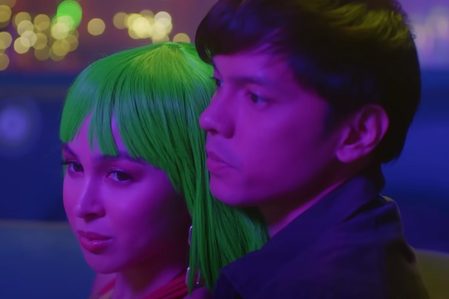SUMMARY
This is AI generated summarization, which may have errors. For context, always refer to the full article.

In a scene during Jason Paul Laxamana’s latest Viva Films venture, Kylie Versoza and Marco Gumabao, both with very little clothing on, commence a bit of role-playing while lying down side by side on a bed. Both of their characters, clearly trying to stop themselves from acting on their most carnal impulses, craft chemistry out of awkwardness and the transactional nature of their set-up. It’s a scene that plays with expectations and then uses restraint as a comedic crutch. Moments like this encapsulate the strengths of a film like Baby Boy, Baby Girl, a mainstream offering that is quite conventional and by-the-numbers.
But what makes this stronger than Laxamana’s previous film, Expensive Candy, is that the main narrative hook — the concept of sugar dating — feels more integrated into the stories of the main characters, the act itself becoming a respite from the burden of poverty. Moving away from sex work, Laxamana delves into the world of companionship and the complexities that it holds.
The first thing it does right is that it doesn’t villainize sugar dating upfront, just that there are people who are better suited for this job than others and that’s okay. Though, at one point, the script tries to make sugar dating into a competition, a ploy to see how many perks and benefits one can get from their “sugar daddies/mommies” and to brag about it. This makes its supporting cast a bit insufferable, sometimes relaying caricature-like personalities. But they are that way because they serve one purpose: to become vessels for Gumabao and Versoza’s competing worldviews.
Gumabao is sort of the guru when it comes to sugar dating, while Versoza is the newbie who still hasn’t had her idealism washed away by materialism. At one point, Gumabao says: “Kaya mas gusto ko ‘tong sugar dating eh. Klaro ang lahat (It’s why I like sugar dating. Everything is clear).” And so it turns out, sugar dating is an escape, a haven for those burnt out from relationships and in search of clearly defined boundaries. It’s nothing new: past films have used other narrative devices that substitute as a coping mechanism for its lead characters, but for what this film is doing — and considering this is a sultry R-16, Viva Films vehicle — it’s good enough.
Kylie Versoza is stunning, especially as she begins indulging in sugar dating and struts as if it’s just another runway lined up for her and her target. It’s a confident turn that shines in scenes where she taps into her model persona. Her looks become currency and it’s mobilized both in the visuals and her character writing. The biggest knock, however, is how hard it can be to shed off that otherworldly “it-factor” she exudes when it comes to translating the resilient soul weathered only by the tempests of poverty.
Versoza is a diamond in the rough, someone who you do not doubt for one second can be a success in sugar dating. She’s endowed with the natural capacity for charm. Yet, the double-edged sword this presents is that it removes any sort of stakes outside of her lack of emotional connection and her inability to give time to her past relationships.
In a small townhouse unit, Versoza’s character is a lone hustler, working like clockwork due to her endless drive to pay bills and have a successful business. As the film continued, I was left wondering, why was she in that predicament in the first place? Why weren’t her parents present? What’s the driving force behind all of this laboriousness?
Gumabao’s character was afforded a backstory that expanded his motivations and struggles, so why not Versoza’s? There are even subtle details like how Versoza claims Gumabao was not as business-minded as she was in the past, and so there’s a scene in the present where Gumabao actually is taking up classes to educate himself. This lack of a backstory is even more striking when we see how Versoza swiftly turns to sugar dating as an option to alleviate her financial concerns (in a visually interesting scene pulled off in long-take fashion). Her pivot is reasonable and relatable, but there could’ve been something more lurking beneath the surface other than just her sustained affection for Gumabao.
Another thing I noticed is the surprising amount of times the film makes fun of its own ridiculousness. Gumabao buys a bunch of brooms on the street, then brings them to his mother, who makes brooms for a living. Gumabao’s mother rightfully scolds him, asking him why he would bring those for her when he knows she has more than enough (even the production design comically includes a crap-ton of brooms in the frame). Strangely, I kind of dig these campy moments and wished the film embraced it more. If you’re gonna title your film Baby Boy, Baby Girl, it deserves to embrace all the schlock and cheesiness it can muster.
Additionally, a surprising discovery I made was that Versoza’s knack for comedy evoked memories of Rufa Mae Quinto. Her quick wit, playful teasing, and loose style are reminiscent — though not entirely imitative — of Quinto’s effortlessly expressive style. Gumabao, who holds his own for most of the movie’s dramatic scenes, seems to be interacting with a Rufa Mae character rather than a Miss International model during moments of lightheartedness, which is probably why I felt that way watching her performance.
But as the pseudo-camp fades away and the serious tone takes over, the movie’s conclusion feels rushed, leaving the impression that it struggles to tie together the more reflective moments that preceded it. Naturally, the two leads see the downsides of the lives they’ve pursued and they begin to return to the lives they had before sugar dating. Like in An Inconvenient Love the year before, the film takes aim at lovers who only want the convenient parts of a relationship, never truly confronting the challenges of living in constant poverty. Gumabao tells Versoza that he wishes they could just cuddle and go on dates all day, but reality dictates that they must face the hardships of life and become better people out of it.
This message is realized in an ending that unexpectedly leaps forward, leaving the audience to piece together the finer details of the couple’s journey without much to work with. Baby Boy, Baby Girl is carried by its delightful set-up and the chemistry of its two leads, but leaves little room for surprises. But when it comes to what one expects with formulas and harmless romances, this is pretty standard stuff. – Rappler.com
‘Baby Boy, Baby Girl’ is now showing in Philippine cinemas nationwide.
Add a comment
How does this make you feel?

There are no comments yet. Add your comment to start the conversation.